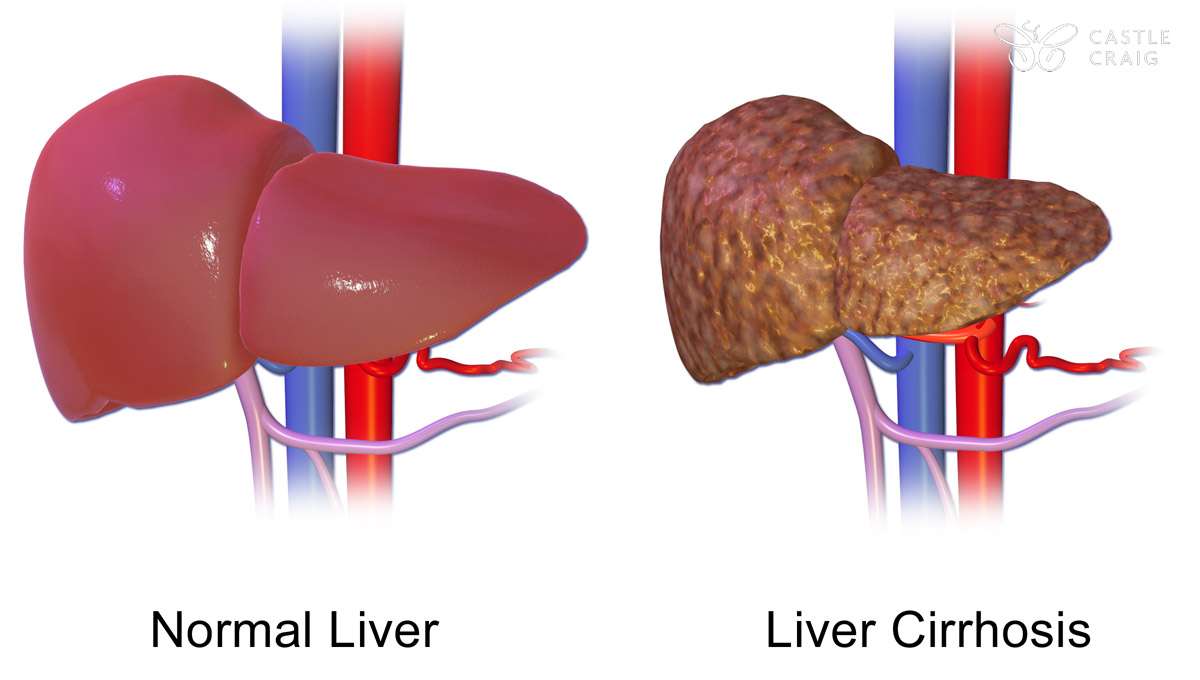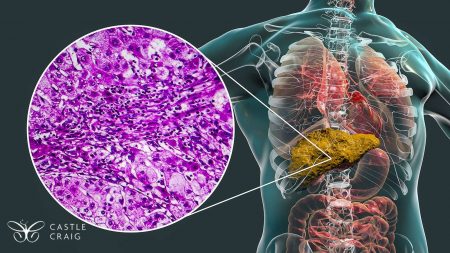Developing ascites is a direct result of liver scarring
Most people have heard of cirrhosis of the liver, but many are unaware that ascites (a-sigh-tees) can develop as a result of liver scarring in cirrhosis. Although Castle Craig is not a specialised centre for treating cirrhosis and its complications, we can help get the person on the road to an alcohol-free life which gives the best chance of recovery for someone with alcohol-related liver disease.
Over 7 in 10 cases of ascites is caused by cirrhosis. Ascites can present serious complications in people suffering from liver cirrhosis and often indicate end-stage liver disease. Liver disease and ascites are often caused by chronic, excess alcohol consumption.
Understanding the causes, symptoms and possible treatment options can prevent the issue from deteriorating further.
What is Ascites?
Ascites is the build-up of excess fluid in the abdomen. The peritoneum—a sheet of tissue that covers the abdominal organs like the stomach, liver, and kidneys – has two membrane layers.
While it’s normal to have a small amount of fluid in the peritoneum cavity, ascites occur when fluid builds up between these two layers, often causing rapid weight gain and discomfort.
As fluid collects in your abdomen, it can begin to affect your kidneys, lungs, and other organs.
Pain and swelling are common, and some people experience difficulty breathing due to the pressure on the lungs. Ascites can also put you at higher risk for an infection in your abdomen.
Ascites can be alleviated by some medical treatments but making lifestyle changes including stopping drinking will help prevent ascites from returning and reduce the chance of other complications such as bleeding from blood vessels in the gullet and stomach.

What Causes Ascites?
This sort of fluid build-up doesn’t often happen in otherwise healthy individuals. Rather, ascites develop as a result of other diseases, such as cirrhosis, kidney failure, or cancer. Cirrhosis is the most common cause of ascites, with the disease accounting for about 80% of cases.
If you have cirrhosis that has caused ascites, it’s because of a chain reaction that’s taken place in your body over time. Your body transports blood to the liver via the portal vein, a large blood vessel. Because cirrhosis slows blood flow through the liver, it puts stress on your portal vein. This is what causes portal hypertension, or high blood pressure at that portal vein.
Continuous high pressure on the vein causes fluid to leak out into your abdomen, where it rapidly collects and can cause uncomfortable symptoms and dangerous complications.
What are the Risk Factors for Ascites?
The main risk factors for ascites include any condition that can cause cirrhosis to develop. One of the most common causes of cirrhosis is excessive alcohol consumption over a long period. As alcohol damages the liver and creates scar tissue, liver function declines.
If you continue to drink heavily, the stages of liver disease progress. Cirrhosis is considered a late-stage liver disease, and it’s at this point that you may develop ascites.
Outside of heavy alcohol consumption, other conditions that can cause cirrhosis include:
- Hepatitis (B and C)
- Non-alcoholic fatty liver disease
- Genetic liver disease
- Kidney failure/Congestive heart failure
- Infections
- Cancer of organs in the abdomen
Signs and Symptoms of Ascites
If you have ascites, you’re most likely to experience rapid weight gain and a growing abdomen. Other potential signs and symptoms include:
- Shortness of breath
- Swelling in the ankles or feet
- Bloating/Loss of appetite
- Indigestion
- Constipation, Difficulty sitting
- Fatigue, Back pain
As more fluid builds up in your abdomen, many people experience painful sensations from the increased pressure on their abdominal organs. You may feel nauseated or have difficulty operating normally, as sitting and moving become increasingly uncomfortable.
If you think you may have developed ascites, it’s important to receive medical care immediately. This is a sign that you have a much more serious underlying condition that has caused the ascites to develop in the first place, such as alcoholic cirrhosis.
Diagnosis and Tests
If you know that you have cirrhosis, there’s a good chance you’re already aware that ascites is a frequent complication of the disease. In any case, your healthcare provider can help you determine if you’ve developed ascites.
First, they’ll perform a physical exam and ask you about your symptoms and medical history. You’ll then likely undergo one or more of the following tests:
- Ultrasound, CT, or MRI scan: Imagining scans can help show your abdominal area in more detail and will reveal if you’ve started to retain fluid between the two layers of your peritoneum.
- Fluid samples: Doctors can analyse the fluid drawn from the abdomen for signs of infection, portal hypertension, or other conditions that can cause ascites.
- Blood tests: Peritoneal fluid analysis via a series of blood tests can help determine the cause of increased fluid in your abdomen.
The purpose of investigating ascites through this comprehensive testing is to help determine the underlying cause of your ascites.
Fluid samples and blood tests, in particular, can help you and your healthcare provider to determine why you’ve developed ascites so that you can begin to treat the underlying cause and ease the painful symptoms—and sometimes life-threatening complications—of excessive fluid retention.
How is Ascites Treated?
While there’s no cure for ascites, there are a few ways to help limit the discomfort it causes and prevent the development of further health complications. The exact treatment plan for ascites is determined by what caused the fluid build-up in the first place. However, there are still general treatment options that can help people suffering from this condition regardless of what’s caused it.
For one, there are dietary changes you can make to help ease the symptoms caused by ascites. Limiting sodium intake is important, with the recommended intake for people with ascites sitting below 2,000-4,000 milligrams a day. You may also need to take diuretics, which help flush excess fluid and sodium from the body. However, some forms of ascites are resistant to diuretics.
In cases of excessive fluid build-up, your healthcare provider may recommend paracentesis.
In this procedure, a needle is inserted into the abdomen to drain excess liquid and ease abdominal pressure. In the most severe cases, a liver transplant may be the best option.

Treating Ascites Caused by Alcoholic Cirrhosis
If you have alcoholic cirrhosis and think you might have developed ascites as a result, it’s vital to address the root cause of your cirrhosis, which is heavy alcohol use.
Here at Castle Craig, we provide comprehensive and compassionate care for people recovering from alcohol addiction. Our proven treatment model utilises the 12 Steps along with evidence-based therapies that help you uncover and examine the root causes of your addiction. Each patient in our inpatient treatment program receives care personalised to their unique struggles, needs, and medical history.
The recovery process is supported by a combination of exercise and a healthy diet, in peaceful, private surroundings. Each patient is assigned a personal focal therapist who works with you throughout your stay, conducts one-on-one therapy sessions and shapes your custom aftercare plan alongside the Head Nurse and Consultant Psychiatrist.
If you’ve developed ascites from alcoholic liver cirrhosis, it’s of the utmost importance to take care of your liver health. The first step after diagnosis is to stop drinking. In alcohol rehab, you’ll have the chance to address the underlying causes of addiction and start living a fulfilling life free from alcohol.
Contact us today for more information about our treatment programmes and to ask any questions you may have.
Frequently Asked Questions
Can ascites be cured?
Typically, ascites cannot be cured. Instead, treatment is focused on managing the condition and easing painful symptoms. In some cases, ascites may be resolved through diuretic therapy, but it depends on what caused your ascites to develop.
For ascites from a short-term illness or condition, ascites can sometimes be successfully treated. For ascites caused by cirrhosis, long-term medical treatment is usually necessary. This is because damage to the liver is permanent. Once scar tissue forms and your liver disease progresses to cirrhosis, there is no way to cure it. But completely avoiding alcohol gives the liver the best chance of functioning.
Will I need surgery for ascites?
In some cases, surgery is necessary to treat ascites. If other forms of treatment like diuretics aren’t enough to reduce fluid build-up, you may need one of the following procedures:
- Paracentesis: a needle is inserted into your abdomen to remove excess fluid.
- Transjugular intrahepatic portosystemic shunt (TIPS): a stent is inserted into a vein in your liver, and then inflated to create a channel that bypasses the liver and helps to drain fluid build-up.
- Liver transplant: in cases of cirrhosis where the liver has begun to fail, a liver transplant may be necessary—not just to treat the ascites, but to preserve life.
How can I prevent ascites?
For ascites caused by alcoholic cirrhosis, the most important preventative measure is to stop drinking.
Are ascites the same as cirrhosis?
Ascites is not the same as cirrhosis. Rather, ascites is a potential complication of cirrhosis. In fact, it’s the most common complication to arise from this form of late-stage liver disease.



